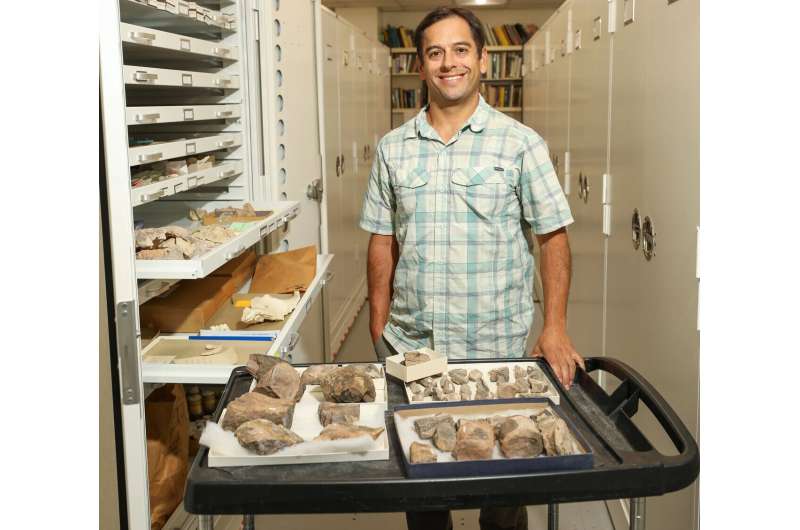Science
Dinosaur Fossil Discovery Expands Range of Tenontosaurus Species

A recent discovery of dinosaur fossils by a researcher from the University of Texas at El Paso may significantly expand the known range of the dinosaur species Tenontosaurus, which roamed the Earth approximately 115 million years ago. Jason W. Ricketts, a professor in UTEP’s Department of Earth, Environmental and Resource Sciences, made the find while conducting unrelated research at the Indio Mountains Research Station (IMRS) in Hudspeth County, Texas.
Ricketts was not specifically searching for fossils on the day of the discovery. “I was studying the rocks in the area when I noticed fragments weathering out of soft shale,” he explained. The fossils, which include a femur leg bone among other fragments, were easily collectable without excavation. Ricketts expressed excitement about the unexpected find, which he documented in a paper titled “An Ornithopod Dinosaur from the Lower Cretaceous of West Texas,” coauthored by Spencer G. Lucas, Ph.D., and Sebastian G. Dalman, a doctoral student at Montana State University.
Significance of the Discovery
Fossil discoveries in West Texas are rare, particularly those involving actual bones rather than footprints. The fragments found by Ricketts have substantial scientific value despite being incomplete. Previously, the closest locations where similar fossils had been documented included Montana, Idaho, Arizona, and other parts of Texas.
“This discovery extends the known range of Tenontosaurus farther southwest than previously documented,” Ricketts stated. Until now, fossils of this species were primarily known from regions further north and east, such as Utah and Wyoming. This finding indicates that Tenontosaurus inhabited areas as far south as West Texas.
The Tenontosaurus was a medium-sized, herbivorous dinosaur that lived during the Early Cretaceous period. The discovery site contributes important insights into how these dinosaurs dispersed across North America and adapted to diverse environments.
Implications for Future Research
Dr. Liz Walsh, interim dean of the UTEP College of Science, praised the discovery, stating that it exemplifies how curiosity-driven research can yield significant insights. “This find highlights the importance of fieldwork and the role of dedicated researchers like Dr. Ricketts in uncovering new chapters of Earth’s history,” she noted. Walsh emphasized that major discoveries can occur when least expected.
As research continues on the fossil fragments, Ricketts hopes this finding will inspire further exploration in West Texas, a region that remains largely unexamined for dinosaur fossils. “This discovery shows that there’s still much to learn about our region’s prehistoric past,” he remarked. “It’s a privilege to contribute even a small piece to that bigger story.”
This discovery not only adds to the scientific community’s understanding of Tenontosaurus but also underscores the potential for further exploration and discoveries in the rich geological landscapes of Texas.
-

 Technology5 months ago
Technology5 months agoDiscover the Top 10 Calorie Counting Apps of 2025
-

 Technology2 weeks ago
Technology2 weeks agoOpenAI to Implement Age Verification for ChatGPT by December 2025
-

 Health3 months ago
Health3 months agoBella Hadid Shares Health Update After Treatment for Lyme Disease
-

 Health3 months ago
Health3 months agoErin Bates Shares Recovery Update Following Sepsis Complications
-

 Health3 months ago
Health3 months agoAnalysts Project Stronger Growth for Apple’s iPhone 17 Lineup
-

 Technology5 months ago
Technology5 months agoDiscover How to Reverse Image Search Using ChatGPT Effortlessly
-

 Technology3 months ago
Technology3 months agoElectric Moto Influencer Surronster Arrested in Tijuana
-

 Technology2 months ago
Technology2 months agoDiscover 2025’s Top GPUs for Exceptional 4K Gaming Performance
-

 Technology5 months ago
Technology5 months agoMeta Initiates $60B AI Data Center Expansion, Starting in Ohio
-

 Technology5 months ago
Technology5 months agoRecovering a Suspended TikTok Account: A Step-by-Step Guide
-

 Health5 months ago
Health5 months agoTested: Rab Firewall Mountain Jacket Survives Harsh Conditions
-

 Lifestyle5 months ago
Lifestyle5 months agoBelton Family Reunites After Daughter Survives Hill Country Floods





















